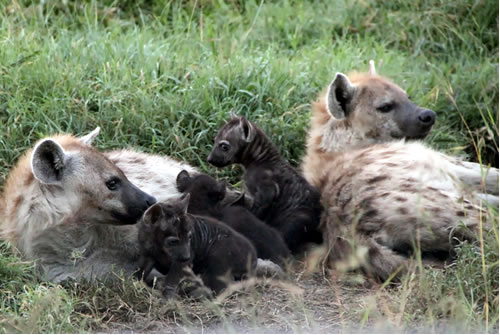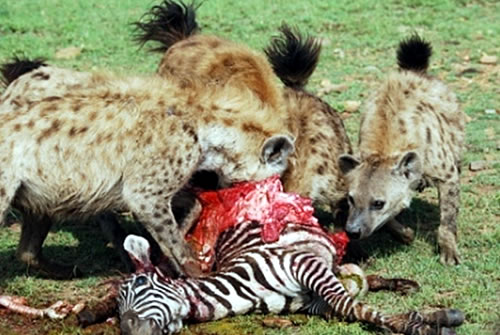Oct. 2000 Proverb: ” The hyena with a cub does not eat up (consume) all the available food.” – Akamba (Kenya)
October, 2000
Mbiti yi mwana ndiisaa ikamina. (Akamba)
Fisi mwenye mtoto hali na kumaliza chakula. (Swahili)
The hyena with a cub does not eat up (consume) all the available food. (English)

Akamba (Kenya )Proverb
Explanation and Everyday Use
In the year 2000 a large region of Eastern Africa went through a long dry spell of the weather. There was a shortage of food, for both people and animals, and famine is reported to have killed a number of them. One of the areas most affected by this shortage of food is Ukambani, the homeland of the Akamba in Kenya. They number about four million persons and live largely in the region eastwards of Nairobi towards the coast. Major and minor famines are a frequent occurrence in Ukambani. During such times people are naturally careful how they get, distribute and share food. Particularly within the family, it is very important that food is shared by all, and that children have priority in getting their share. Parents would rather starve than see their children going hungry. It is with this basic concern that the Akamba formulated and use the proverb: Mbiti yi mwana ndiisaa ikamina (The hyena with a cub does not eat up (consume) all the available food).
In July-August, 2000 I saw this proverb applied during the famine that had hit the country. People with basically very little to eat nevertheless shared it with others who had even less. I felt very touched by this spirit of caring and sharing.
In former times Ukambani was well populated with wild animals, both small and big like elephants, giraffes, lions, dick-dicks, hares, squirrels and many others. By the end of the twentieth century their number had considerably decreased, especially in the more densely populated parts of the country. Among the animals, the hyena is regarded as being voracious, gregarious and always hungry. It is said to eat other animals and people even when their flesh is rotten. In this regard the hyena is the symbol of being always hungry. But, in spite of this strong trait, the hyena is a deeply caring animal. People believe that when it finds food it will always leave some for its cubs, even in its great hunger. The parent hyena has the strength and experience to hunt or search for food which is something that its cubs may not at first be able to do. It will gobble down that food with enthusiasm. But it does not forget its cubs. It spares food for them and denies its own needs, even when it may not get enough to still its own hunger.
 Biblical Parallels
Biblical Parallels
As the Biblical story tells we are or should be our brothers’ and sisters’ keepers. See Genesis 4:9: “Then the Lord said to Cain, ‘Where is your brother Abel?’ He said, ‘I do not know; am I my brother’s keeper?’”
Jesus demonstrated this lesson to His followers as recorded in the Gospels. He showed them that sharing even the little there is brings unimaginable blessings. A large crowd of people gathered to hear Him near the lake of Galilee. “And when it grew late, His disciples came to Him and said, ‘This is a lonely place, and the hour is now late; send them away, to go and buy themselves something to eat.’ But He answered them, ‘They need not go away; you give them something to eat!‘ And they said to Him, ‘Shall we go and buy two hundred denarii worth of bread, and give it to them to eat?’ And He said to them, ‘How many loaves have you? Go and see.’ And when they had found out, they said, ‘Five and two fish.’ … And taking the five loaves and the two fish He looked up to heaven, and blessed, and broke the loaves, and gave them to the disciples to set before the people; and He divided the two fish among them all. And they all ate and were satisfied. And they took up twelve baskets full of broken pieces and of the fish. And those who ate the loaves were five thousand men, besides women and children” (Mark 6:30-44 and parallels, Matthew 14:13-21; Luke 9:10-17 and John 6:1-14).
This is the only miracle of Jesus recorded in all the four Gospels. It is significant that in John’s account it is a young boy who actually gives his picnic over to Jesus, and the latter turns it into a blessing for thousands of other people. Had the boy or the disciples eaten up all what was available, thousands would have gone hungry. So the Akamba proverb applied very well to the situation: The hyena with a cub does not eat up (consume) all the available food. See also the parable of the goats and the sheep at the end of time in Matthew 25: 31-46 and James 2:15-16 where the apostle posed the challenge which is still relevant: “If a brother or sister is ill-clad and in lack of daily food; and one of you says to them, ‘Go in peace, be warmed and filled,’ without giving them the things needed for the body, what does it profit?”
Contemporary Use and Application
This proverb is currently very applicable when Ukambani is going through a period of famine (as are other parts of Kenya). It urges and reminds people to share their food, their means of sustenance, for the sake of their own survival and that of their children. The proverb addresses particularly the human virtue of caring for one another, being sensitive to the needs of others, or even sacrificing something so that others may also have a share. This applies immediately to family circles.
But the proverb has implications for the wider society. There are those who, through circumstances, hard work and effort (or even through exploitation and “robbery”), have more earthly goods than others do. Or they may have better means to acquire those goods for the welfare of life. The proverb is a challenge and a call to care for others and share what is available and not just keep it for oneself or consume it all. As the Biblical story tells (Genesis 4), we are or should be our brothers’ and sisters’ keepers on the family level as well as on national and international scenes. If the hungriest of the animals, the hyena, shares part of its meal with the cubs, how much more can persons likewise do? Only in that way can the family, the nation, and persons of the world survive — if the “parents” care enough for the “children.” But this applies not only to material food, but also to the spiritual virtues of caring, love, justice, joy, peace and hope. Everywhere there are hungry cubs to be fed with different types of nourishment. Ultimately society cannot survive where and when these “meals” of life are missing or become short. Everyone can share them with someone else, just as the hyena leaves a portion of the meal for its cub. That way both of them can survive, even in good and hard times.
NOTE: For further background on African Proverbs, Sayings and Stories see:
African Proverbs CD ROM, edited by Stan Nussbaum, Global Mapping International, Colorado Springs, 1996. Go to CDs page or contact provsupport@gmi.org.
Mbiti, John S. (ed.). Akamba Stories. Nairobi: Oxford University Press, 1983.
Dr. John S. Mbiti
Kitui, Kenya and Burgdorf, Switzerland
John.mbiti@freesurf.ch
